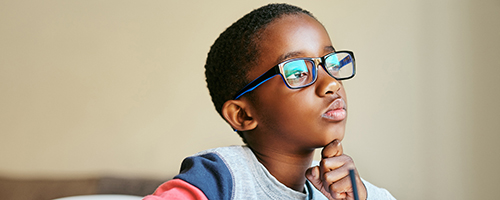Patient Information
As the region's most comprehensive center for pediatric eye care, we invite you to learn more about what we do to preserve vision and restore sight. From information about general eye care to explanations about complex genetic conditions, our goal is to be your trusted resource for pediatric eye care and adult strabismus (crossed eyes).
vision and restore sight. From information about general eye care to explanations about complex genetic conditions, our goal is to be your trusted resource for pediatric eye care and adult strabismus (crossed eyes).
Our Services
- Routine eye exams
- Management of hereditary and genetic eye disease
- Amblyopia screening
- Medical and surgical management of eye injuries
- Pediatric & adult strabismus (crossed eyes) surgery
- Treatment of pediatric inflammatory eye disease (Uveitis)
- Medical and surgical management of pediatric glaucoma and cataracts
- Management of pediatric eye cancers
- Treatment of pediatric corneal disease
- Gene therapy, including administration of Luxturna for the RPE65 gene
Glossary of Conditions
Albinism
Amblyopia
Aniridia
Axenfeld-Reiger syndrome
Bardet-Bidel syndrome
Batten disease
Best disease
Canalicular laceration
Chalazion
Chemical injury
Coloboma
Cone-rod dystrophy
Congenital cataract
Congenital glaucoma
Corneal abrasion
Corneal/Scleral laceration
Hyphema
Juvenile open angle glaucoma
Juvenile X-linked retinoschisis
Keratoconus/Hydrops
Leber congenital amaurosis
Lid laceration
Morning glory anomaly
Neurofibromatosis
Neurotrophic keratitis
Nystagmus
Optic nerve hyploplasia
Peters anomaly
Retinitis pigmentosa
Traumatic Iritis
Tuberous sclerosis
Uveitis
Ushers syndrome
Video Library
Coming soon
Pediatric eye screening guidelines
Newborns
Pediatricians screen newborns for any physical, genetic or developmental abnormalities that may be vision related. In cases of prematurity, a pediatric ophthalmologist or retina specialist may be consulted. Abnormal findings are reported to a pediatric ophthalmologist who may evaluate the child.
Six months to five years
A pediatrician will check a child’s eyes for health, visual development and alignment at each of your child's wellness check-ups. Abnormal or inconsistent findings may be reported to a pediatric ophthalmologist who may evaluate the child
Five years
Vision in each eye should be checked separately every year. These screenings may be performed by a pediatrician or licensed school personnel. If a problem is found during routine eye screenings, your child's doctor or school may have your child see a pediatric ophthalmologist or other eye care professional.
Six years
Pediatricians and school personnel may perform vision screenings into adolescence. As any abnormal symptoms appear, children should be referred appropriately to an eye care specialist to manage symptoms and ensure a child’s visual potential is fully realized
Please note
At any given time that symptoms or risk factors appear, a child may be more frequently evaluated by a professional capable of managing the symptoms or risk factors for developing eye disease.
Pediatric optical services
Our optical shops include experienced opticians who work with our ophthalmologists and optometrists to make every child's experience with glasses and contacts special. This includes spectacle fittings for infants and expertise in lenses for double vision caused by misaligned eyes. They feature large variety of frames for all ages that are both stylish and safe.